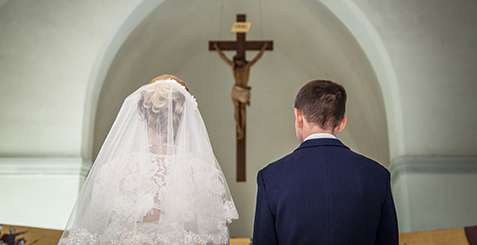Earlier this week, I had the pleasure of making public Pope Francis’ theme for next year’s World Meeting of Families in Philadelphia: Love is our mission: the family fully alive. The theme was inspired by the words of the early Church Father, St. Irenaeus, who said that “the glory of God is man fully alive.” In like manner, the glory of men and women is their capacity to love as God loves. And rarely can that love be lived out more intimately and fruitfully than in the family.
 As we begin the “heavy lifting” to prepare for the World Meeting of Families and a possible papal visit, it’s a good moment to pause and reflect.
As we begin the “heavy lifting” to prepare for the World Meeting of Families and a possible papal visit, it’s a good moment to pause and reflect.
Every moment of every day, a mother and father are teaching and guiding each other and their children, while witnessing about their love to the world beyond their home. The structure of marriage — if lived faithfully — naturally points a man and woman outward toward the world, as well as inward toward one another and their children. As Augustine once said: “To be faithful in little things is a big thing.”
Simply by living their vocation, a husband and wife become the most important living cell of society. Marriage is the foundation and guarantee of the family. And the family is the foundation and guarantee of society.
It’s within the intimate community of the family that a son knows he is loved and has value. In observing her parents, a daughter first learns basic values like loyalty, honesty and selfless concern for others, which build up the character of the wider society. Truth is always most persuasive, not when we read about it in a book or hear about it in a classroom, but when we see it incarnated in the actions of our parents.
Marriage and family safeguard our most basic sense of community, because within the family, the child grows up in a web of tightly connected rights and responsibilities to other people. It also protects our individual identity, because it surrounds the child with a mantle of privacy and personal devotion. Most of the laws concerning marriage in our culture were originally developed precisely to protect family members from the selfishness and lack of love so common in wider society.
The family is the human person’s single most important sanctuary from mistaken models of love, misguided notions of sexual relationships and destructive ideas about self‑fulfillment. All these painful things, unchecked, can be a centrifugal force pulling families apart.
Love is a counter-force. Love is the glue both for family and society. This is why love is the fundamental mission of the family. It’s why the family must be a sanctuary of love. We most easily understand love when we, ourselves, are the fruit of our parents’ tenderness. We most easily believe in fidelity when we see it modeled by our father and mother.
Love lived generously is the unanswerable argument for God — and also for the dignity of the human heart. And marriage is transformed and fulfilled when spouses cooperate with God in the creation of new life. A husband and wife are completed by sharing in God’s procreative gift of life to their children, who are new and unique images of God.
In my years as a priest and bishop, I’ve seen again and again that the human heart is made for truth. People are hungry for the truth; and they’ll choose it, if it’s presented clearly and with conviction. Therein lies the need for every Christian marriage to be engaged in preaching by example. A husband and wife who model a love for Jesus Christ within their family — who pray and worship together with their children and read the Scriptures — become a beacon for other couples. They also more easily acquire an outward-looking zeal for consciously spreading the Gospel to others, teaching the faith and doing good apostolic works.
Our God is the God of life, abundance, deliverance and joy. And we’re his missionaries by nature and by mandate. In a developed world increasingly indifferent or hostile to God, no Catholic family can afford to be lukewarm about the Church. No culture is so traditionally “Christian” that it’s heard enough about Jesus Christ, or safe from the unbelief and disregard for human dignity which mark our age.
Catholic families have a key role in God’s healing of a broken world. So let’s pray for each other — beginning right now — that the World Meeting of Families 2015 will become for each of us and all of Philadelphia a new Pentecost; a new birth of the Church in each of our hearts … for our own salvation, the salvation of our families and the redemption of the world.
Source: Originally posted in Archbishop Chaput’s column on CatholicPhilly.com on May 15th, 2014.




 When my wife and I got married, we had the privilege of making a pilgrimage to Rome as our honeymoon trip. While in Rome, we saw a number of churches, but one in particular stood out to me: Chiesa del Gesu (The Church of Jesus; pictured right). In this beautiful old baroque church there is a unique relic: the forearm of St. Francis Xavier, the great Jesuit missionary. While visiting an altar with a body part on display may not seem too romantic for a date, let alone a honeymoon, it actually became one of the most romantic places of our honeymoon! Why? Because I realized before that altar that relics are an important cipher for understanding the vocation I embarked upon in marriage.
When my wife and I got married, we had the privilege of making a pilgrimage to Rome as our honeymoon trip. While in Rome, we saw a number of churches, but one in particular stood out to me: Chiesa del Gesu (The Church of Jesus; pictured right). In this beautiful old baroque church there is a unique relic: the forearm of St. Francis Xavier, the great Jesuit missionary. While visiting an altar with a body part on display may not seem too romantic for a date, let alone a honeymoon, it actually became one of the most romantic places of our honeymoon! Why? Because I realized before that altar that relics are an important cipher for understanding the vocation I embarked upon in marriage.
